
Papal conclave, September 1503
Encyclopedia
The papal conclave, September 1503 elected Pope Pius III
to succeed Pope Alexander VI
. Due to the Italian Wars
, the College of Cardinals
was surrounded by three potentially hostile armies, loyal to Louis XII of France
, Ferdinand II of Aragon
, and Cesare Borgia
(the cardinal-nephew
of Alexander VI).
The participation of thirty-nine cardinals, made possible by the delay of the funeral of Alexander VI, made the conclave the largest in history, up to that time, in terms of the number of electors. There were 21 Italian cardinals, 11 Spanish, and 7 French. A convergence of factors undid years of planning by Louis XII and his predecessor Charles VIII of France
to promote the candidacy of Georges d'Amboise
. After receiving far fewer votes than expected on the first ballot due to the independent candidacy of Giuliano della Rovere and the loss of control of the Spanish cardinals by Cesare Borgia, d'Amboise threw his support to Francesco Piccolomini, who was elected Pius III on the second ballot despite receiving only four on the first.
The conclave was the first in two centuries held under the pall of an "outsider army". The Italian Wars
had been under way since Charles VIII of France
decided to enforce the Angevin
claim to the Kingdom of Naples
, ousting Ferrante of Aragon, who in turn was aided by his relative Ferdinand II of Aragon
.
Alexander VI had initially sided with Ferdinand of Aragon but in 1498 recognized Louis XII of France
, the heir of Charles VIII, as the king of Naples. Nevertheless, Ferdinand had made serious gains in the war, forcing Louis to send a reinforcement force in 1503 which neared Rome when Alexander VI died in August. Rather than continue to Naples, Louis XII ordered his force to wait outside Rome for the duration of the conclave. The Neapolitan army was only forty miles to the South as well.
Cesare Borgia
, Alexander VI's former cardinal-nephew
and Captain General of the Church
also commanded a papal army within the walls of Rome; however, Cesare's influence was weakened by his sudden illness. The College of Cardinals initially decided to meet in Castel Sant'Angelo
due to the triple threat of armed interference, and the start of the conclave was delayed by the need to prepare the building for this new use and for Cesare acquiesce to removing his troops from the city. However, on September 3, the College elected to move to a chapel in the Apostolic Palace
designed by Niccolò dell'Arca.
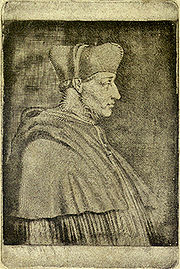
There were thirty-nine cardinal electors.
Cardinal Georges d'Amboise
was the favorite of Louis XII, and also expected the support of the faction of Cardinal Giuliano della Rovere
(future Pope Julius II), who had fled to France due to a dispute with Alexander VI. Furthermore, Charles VII and later Louis XII had been campaigning of d'Ambroise's behalf for years and had entered into a secret treaty with Cesare Borgia for the support of the eleven Spanish cardinals (more loyal to Cesare than the Spanish monarch) in exchange for the maintenance of his numerous territorial claims. Ascanio Sforza
, who had been taken prisoner by the French in 1500 when they captured Milan
, was also freed in exchange for his promise to vote for d'Ambroise.
d'Ambroise was also bankrolled with a large sum of gold and—according to the Venetian ambassador—no attempt at bribe or threat was spared. The Roman crowds hailed him as the next pope when he triumphantly entered the city on September 10.
A French agent informed the College that the king would regard it as a "major affront" were the conclave to begin before the arrival of d'Ambroise and the other French cardinals. Della Rovere, from Genoa, also sent a courier to demand the College await his arrival as well. Rather than begin the conclave after the proscribed ten days after the pope's funeral, the College opted to delay Alexander VI's funeral to accommodate these demands, and the conclave was entered on September 21. d'Ambroise and his supporters were able to arrive in time and only two of the eight absent cardinals were French.
The thirty-nine cardinal-electors made the election the largest since the creation of the papal conclave
.
, did not regard d'Ambroise's election as certainly as the Roman public. His odds were set at 13 to 100, while della Rovere's were 15 to 100; Cardinal Piccolomini (elected Pope Pius III
) was the favorite at 30 to 100.
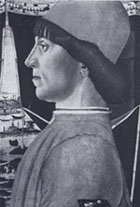 The cardinals began by drafting a conclave capitulation
The cardinals began by drafting a conclave capitulation
, unlike all previous capitulations in that it contained no mention of limiting the size of the College of Cardinals
to 24. It did, however, include a payment of 2,400 ducats from the pope annually to any cardinal with income less than 6,000 ducats.
The French cardinals soon discovered the wisdom of the bookmakers, having underestimated della Rovere's ambition and overestimated his loyalty. He declared that he would only vote for d'Ambroise if he was the final vote needed for d'Ambroise to be elected. Furthermore, della Rovere declared he wished to see an Italian pope rather than a "barbarian" (non-Italian) and feared the return of the Avignon Papacy
, an opinion shared by all twenty-two Italian cardinals. d'Ambroise agreed to move the French army farther north as a sign of good faith before he realized the intentions of della Rovere.
Ascanio Sforza
, however, kept to his word to vote for d'Ambroise, although he did not attempt to persuade any other Italian cardinal to do so.
Furthermore, Cesare Borgia
proved too ill to exert control over the Spanish cardinals, who instead followed the instructions of the king of Spain to vote against the French.Baumgartner, 2003, p. 89. The Spaniards themselves could not be elected due to the antagonism of the Italian cardinals against Alexander VI.
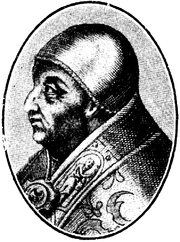 The different accounts of the conclave (written by the conclavists for the various cardinals) disagree on the number of votes received by the three papabile
The different accounts of the conclave (written by the conclavists for the various cardinals) disagree on the number of votes received by the three papabile
; on the first scrutiny. Baumgatner regards as the most accurate the account according 15 votes to della Rovere, 13 to d'Ambroise, and 4 to Piccolomini. This was bad news for d'Ambroise, who knew that many of his pledged supporters had promised only to vote for him on the first scrutiny. Therefore, d'Ambroise threw his support to Piccolomini.
Piccolomini was elected by accessus
on the second scrutiny, taking the name Pius III
after his uncle Pius II
. The sixty-four year old Piccolomini was too ill even to attend this scrutiny. Since he was only a deacon
, Piccolomini was ordained a bishop by della Rovere, only to die on October 18.
Pope Pius III
Pope Pius III , born Francesco Todeschini Piccolomini, was Pope from September 22 to October 18, 1503.-Career:...
to succeed Pope Alexander VI
Pope Alexander VI
Pope Alexander VI , born Roderic Llançol i Borja was Pope from 1492 until his death on 18 August 1503. He is one of the most controversial of the Renaissance popes, and his Italianized surname—Borgia—became a byword for the debased standards of the Papacy of that era, most notoriously the Banquet...
. Due to the Italian Wars
Italian Wars
The Italian Wars, often referred to as the Great Italian Wars or the Great Wars of Italy and sometimes as the Habsburg–Valois Wars, were a series of conflicts from 1494 to 1559 that involved, at various times, most of the city-states of Italy, the Papal States, most of the major states of Western...
, the College of Cardinals
College of Cardinals
The College of Cardinals is the body of all cardinals of the Catholic Church.A function of the college is to advise the pope about church matters when he summons them to an ordinary consistory. It also convenes on the death or abdication of a pope as a papal conclave to elect a successor...
was surrounded by three potentially hostile armies, loyal to Louis XII of France
Louis XII of France
Louis proved to be a popular king. At the end of his reign the crown deficit was no greater than it had been when he succeeded Charles VIII in 1498, despite several expensive military campaigns in Italy. His fiscal reforms of 1504 and 1508 tightened and improved procedures for the collection of taxes...
, Ferdinand II of Aragon
Ferdinand II of Aragon
Ferdinand the Catholic was King of Aragon , Sicily , Naples , Valencia, Sardinia, and Navarre, Count of Barcelona, jure uxoris King of Castile and then regent of that country also from 1508 to his death, in the name of...
, and Cesare Borgia
Cesare Borgia
Cesare Borgia , Duke of Valentinois, was an Italian condottiero, nobleman, politician, and cardinal. He was the son of Pope Alexander VI and his long-term mistress Vannozza dei Cattanei. He was the brother of Lucrezia Borgia; Giovanni Borgia , Duke of Gandia; and Gioffre Borgia , Prince of Squillace...
(the cardinal-nephew
Cardinal-nephew
A cardinal-nephew is a cardinal elevated by a Pope who is that cardinal's uncle, or, more generally, his relative. The practice of creating cardinal-nephews originated in the Middle Ages, and reached its apex during the 16th and 17th centuries. The word nepotism originally referred specifically to...
of Alexander VI).
The participation of thirty-nine cardinals, made possible by the delay of the funeral of Alexander VI, made the conclave the largest in history, up to that time, in terms of the number of electors. There were 21 Italian cardinals, 11 Spanish, and 7 French. A convergence of factors undid years of planning by Louis XII and his predecessor Charles VIII of France
Charles VIII of France
Charles VIII, called the Affable, , was King of France from 1483 to his death in 1498. Charles was a member of the House of Valois...
to promote the candidacy of Georges d'Amboise
Georges d'Amboise
Georges d'Amboise was a French Roman Catholic cardinal and minister of state. He belonged to the house of Amboise, a noble family possessed of considerable influence: of his nine brothers, four were bishops. His father, Pierre d'Amboise, seigneur de Chaumont, was chamberlain to Charles VII and...
. After receiving far fewer votes than expected on the first ballot due to the independent candidacy of Giuliano della Rovere and the loss of control of the Spanish cardinals by Cesare Borgia, d'Amboise threw his support to Francesco Piccolomini, who was elected Pius III on the second ballot despite receiving only four on the first.
Background
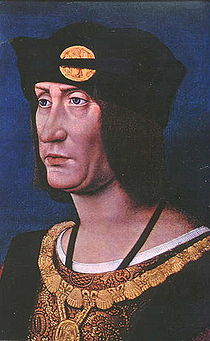 |
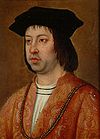 |
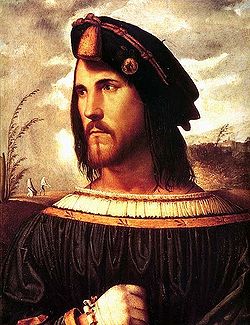 |
The conclave was the first in two centuries held under the pall of an "outsider army". The Italian Wars
Italian Wars
The Italian Wars, often referred to as the Great Italian Wars or the Great Wars of Italy and sometimes as the Habsburg–Valois Wars, were a series of conflicts from 1494 to 1559 that involved, at various times, most of the city-states of Italy, the Papal States, most of the major states of Western...
had been under way since Charles VIII of France
Charles VIII of France
Charles VIII, called the Affable, , was King of France from 1483 to his death in 1498. Charles was a member of the House of Valois...
decided to enforce the Angevin
House of Valois-Anjou
The Valois House of Anjou, or the Younger House of Anjou, was a noble French family, deriving from the royal family, the House of Valois. They were monarchs of Naples, as well as various other territories....
claim to the Kingdom of Naples
Kingdom of Naples
The Kingdom of Naples, comprising the southern part of the Italian peninsula, was the remainder of the old Kingdom of Sicily after secession of the island of Sicily as a result of the Sicilian Vespers rebellion of 1282. Known to contemporaries as the Kingdom of Sicily, it is dubbed Kingdom of...
, ousting Ferrante of Aragon, who in turn was aided by his relative Ferdinand II of Aragon
Ferdinand II of Aragon
Ferdinand the Catholic was King of Aragon , Sicily , Naples , Valencia, Sardinia, and Navarre, Count of Barcelona, jure uxoris King of Castile and then regent of that country also from 1508 to his death, in the name of...
.
Alexander VI had initially sided with Ferdinand of Aragon but in 1498 recognized Louis XII of France
Louis XII of France
Louis proved to be a popular king. At the end of his reign the crown deficit was no greater than it had been when he succeeded Charles VIII in 1498, despite several expensive military campaigns in Italy. His fiscal reforms of 1504 and 1508 tightened and improved procedures for the collection of taxes...
, the heir of Charles VIII, as the king of Naples. Nevertheless, Ferdinand had made serious gains in the war, forcing Louis to send a reinforcement force in 1503 which neared Rome when Alexander VI died in August. Rather than continue to Naples, Louis XII ordered his force to wait outside Rome for the duration of the conclave. The Neapolitan army was only forty miles to the South as well.
Cesare Borgia
Cesare Borgia
Cesare Borgia , Duke of Valentinois, was an Italian condottiero, nobleman, politician, and cardinal. He was the son of Pope Alexander VI and his long-term mistress Vannozza dei Cattanei. He was the brother of Lucrezia Borgia; Giovanni Borgia , Duke of Gandia; and Gioffre Borgia , Prince of Squillace...
, Alexander VI's former cardinal-nephew
Cardinal-nephew
A cardinal-nephew is a cardinal elevated by a Pope who is that cardinal's uncle, or, more generally, his relative. The practice of creating cardinal-nephews originated in the Middle Ages, and reached its apex during the 16th and 17th centuries. The word nepotism originally referred specifically to...
and Captain General of the Church
Captain General of the Church
The Captain General of the Church was the de facto commander-in-chief of the papal armed forces during the Middle Ages. The post was usually conferred on an Italian noble with a professional military reputation or a relative of the pope...
also commanded a papal army within the walls of Rome; however, Cesare's influence was weakened by his sudden illness. The College of Cardinals initially decided to meet in Castel Sant'Angelo
Castel Sant'Angelo
The Mausoleum of Hadrian, usually known as the Castel Sant'Angelo, is a towering cylindrical building in Parco Adriano, Rome, Italy. It was initially commissioned by the Roman Emperor Hadrian as a mausoleum for himself and his family...
due to the triple threat of armed interference, and the start of the conclave was delayed by the need to prepare the building for this new use and for Cesare acquiesce to removing his troops from the city. However, on September 3, the College elected to move to a chapel in the Apostolic Palace
Apostolic Palace
The Apostolic Palace is the official residence of the Pope, which is located in Vatican City. It is also known as the Sacred Palace, the Papal Palace and the Palace of the Vatican...
designed by Niccolò dell'Arca.
Cardinal-electors

There were thirty-nine cardinal electors.
Cardinal Georges d'Amboise
Georges d'Amboise
Georges d'Amboise was a French Roman Catholic cardinal and minister of state. He belonged to the house of Amboise, a noble family possessed of considerable influence: of his nine brothers, four were bishops. His father, Pierre d'Amboise, seigneur de Chaumont, was chamberlain to Charles VII and...
was the favorite of Louis XII, and also expected the support of the faction of Cardinal Giuliano della Rovere
Pope Julius II
Pope Julius II , nicknamed "The Fearsome Pope" and "The Warrior Pope" , born Giuliano della Rovere, was Pope from 1503 to 1513...
(future Pope Julius II), who had fled to France due to a dispute with Alexander VI. Furthermore, Charles VII and later Louis XII had been campaigning of d'Ambroise's behalf for years and had entered into a secret treaty with Cesare Borgia for the support of the eleven Spanish cardinals (more loyal to Cesare than the Spanish monarch) in exchange for the maintenance of his numerous territorial claims. Ascanio Sforza
Ascanio Sforza
Ascanio Maria Sforza Visconti was an Italian Cardinal of the Catholic Church, generally known as a skilled diplomat who played a major role in the election of Rodrigo Borgia as Pope Alexander VI.-Early years:...
, who had been taken prisoner by the French in 1500 when they captured Milan
Milan
Milan is the second-largest city in Italy and the capital city of the region of Lombardy and of the province of Milan. The city proper has a population of about 1.3 million, while its urban area, roughly coinciding with its administrative province and the bordering Province of Monza and Brianza ,...
, was also freed in exchange for his promise to vote for d'Ambroise.
d'Ambroise was also bankrolled with a large sum of gold and—according to the Venetian ambassador—no attempt at bribe or threat was spared. The Roman crowds hailed him as the next pope when he triumphantly entered the city on September 10.
A French agent informed the College that the king would regard it as a "major affront" were the conclave to begin before the arrival of d'Ambroise and the other French cardinals. Della Rovere, from Genoa, also sent a courier to demand the College await his arrival as well. Rather than begin the conclave after the proscribed ten days after the pope's funeral, the College opted to delay Alexander VI's funeral to accommodate these demands, and the conclave was entered on September 21. d'Ambroise and his supporters were able to arrive in time and only two of the eight absent cardinals were French.
The thirty-nine cardinal-electors made the election the largest since the creation of the papal conclave
Papal conclave
A papal conclave is a meeting of the College of Cardinals convened to elect a Bishop of Rome, who then becomes the Pope during a period of vacancy in the papal office. The Pope is considered by Roman Catholics to be the apostolic successor of Saint Peter and earthly head of the Roman Catholic Church...
.
The papabile
The Roman bookmakers, accustomed to gambling on papal electionsGambling on papal elections
Gambling on papal elections has at least a 500-year history. Betting on 16th-century papal conclaves are among the first documented examples of gambling on election outcomes...
, did not regard d'Ambroise's election as certainly as the Roman public. His odds were set at 13 to 100, while della Rovere's were 15 to 100; Cardinal Piccolomini (elected Pope Pius III
Pope Pius III
Pope Pius III , born Francesco Todeschini Piccolomini, was Pope from September 22 to October 18, 1503.-Career:...
) was the favorite at 30 to 100.
Proceedings

Conclave capitulation
A conclave capitulation is a capitulation drawn up by the College of Cardinals during a papal conclave, attempting to constrain the actions of the Pope elected by the conclave. Generally, all cardinals would swear to uphold it if elected Pope, and the capitulation would be finished before the first...
, unlike all previous capitulations in that it contained no mention of limiting the size of the College of Cardinals
Size of the College of Cardinals
The size of the College of Cardinals has historically been limited by popes, ecumenical councils, and even the College itself. From 1099 to 1986, the total number of cardinals was approximately 2900 The size of the College of Cardinals has historically been limited by popes, ecumenical councils,...
to 24. It did, however, include a payment of 2,400 ducats from the pope annually to any cardinal with income less than 6,000 ducats.
The French cardinals soon discovered the wisdom of the bookmakers, having underestimated della Rovere's ambition and overestimated his loyalty. He declared that he would only vote for d'Ambroise if he was the final vote needed for d'Ambroise to be elected. Furthermore, della Rovere declared he wished to see an Italian pope rather than a "barbarian" (non-Italian) and feared the return of the Avignon Papacy
Avignon Papacy
The Avignon Papacy was the period from 1309 to 1376 during which seven Popes resided in Avignon, in modern-day France. This arose from the conflict between the Papacy and the French crown....
, an opinion shared by all twenty-two Italian cardinals. d'Ambroise agreed to move the French army farther north as a sign of good faith before he realized the intentions of della Rovere.
Ascanio Sforza
Ascanio Sforza
Ascanio Maria Sforza Visconti was an Italian Cardinal of the Catholic Church, generally known as a skilled diplomat who played a major role in the election of Rodrigo Borgia as Pope Alexander VI.-Early years:...
, however, kept to his word to vote for d'Ambroise, although he did not attempt to persuade any other Italian cardinal to do so.
Furthermore, Cesare Borgia
Cesare Borgia
Cesare Borgia , Duke of Valentinois, was an Italian condottiero, nobleman, politician, and cardinal. He was the son of Pope Alexander VI and his long-term mistress Vannozza dei Cattanei. He was the brother of Lucrezia Borgia; Giovanni Borgia , Duke of Gandia; and Gioffre Borgia , Prince of Squillace...
proved too ill to exert control over the Spanish cardinals, who instead followed the instructions of the king of Spain to vote against the French.Baumgartner, 2003, p. 89. The Spaniards themselves could not be elected due to the antagonism of the Italian cardinals against Alexander VI.
Scrutinies

Papabile
Papabile is an unofficial Italian term first coined by Vaticanologists and now used internationally in many languages to describe a cardinal of whom it is thought likely or possible that he will be elected pope. A literal English translation would be "popeable" or "one who might become pope".In...
; on the first scrutiny. Baumgatner regards as the most accurate the account according 15 votes to della Rovere, 13 to d'Ambroise, and 4 to Piccolomini. This was bad news for d'Ambroise, who knew that many of his pledged supporters had promised only to vote for him on the first scrutiny. Therefore, d'Ambroise threw his support to Piccolomini.
Piccolomini was elected by accessus
Accessus
Accessus is a term applied to the voting in conclave for the election of a pope, by which a cardinal changes his vote and accedes to some other candidate. Accessus voting was first used in the papal conclave, 1455...
on the second scrutiny, taking the name Pius III
Pope Pius III
Pope Pius III , born Francesco Todeschini Piccolomini, was Pope from September 22 to October 18, 1503.-Career:...
after his uncle Pius II
Pope Pius II
Pope Pius II, born Enea Silvio Piccolomini was Pope from August 19, 1458 until his death in 1464. Pius II was born at Corsignano in the Sienese territory of a noble but decayed family...
. The sixty-four year old Piccolomini was too ill even to attend this scrutiny. Since he was only a deacon
Deacon
Deacon is a ministry in the Christian Church that is generally associated with service of some kind, but which varies among theological and denominational traditions...
, Piccolomini was ordained a bishop by della Rovere, only to die on October 18.

